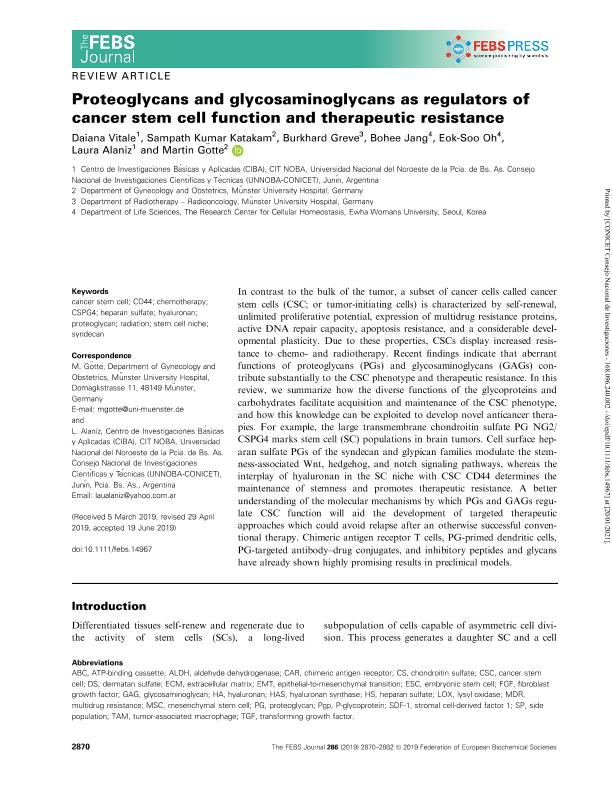Artículo
Proteoglycans and glycosaminoglycans as regulators of cancer stem cell function and therapeutic resistance
Vitale, Daiana Luján ; Kumar Katakam, Sampath; Greve, Burkhard; Jang, Bohee; Oh, Eok Soo; Alaniz, Laura Daniela
; Kumar Katakam, Sampath; Greve, Burkhard; Jang, Bohee; Oh, Eok Soo; Alaniz, Laura Daniela ; Götte, Martin
; Götte, Martin
 ; Kumar Katakam, Sampath; Greve, Burkhard; Jang, Bohee; Oh, Eok Soo; Alaniz, Laura Daniela
; Kumar Katakam, Sampath; Greve, Burkhard; Jang, Bohee; Oh, Eok Soo; Alaniz, Laura Daniela ; Götte, Martin
; Götte, Martin
Fecha de publicación:
23/06/2019
Editorial:
Wiley Blackwell Publishing, Inc
Revista:
Febs Journal
ISSN:
1742-464X
e-ISSN:
1432-1033
Idioma:
Inglés
Tipo de recurso:
Artículo publicado
Clasificación temática:
Resumen
In contrast to the bulk of the tumor, a subset of cancer cells called cancer stem cells (or tumor-initiating cells) is characterized by self-renewal, unlimited proliferative potential, expression of multidrug-resistance proteins, active DNA repair capacity, apoptosis resistance, and a considerable developmental plasticity. Due to these properties, cancer stem cells display increased resistance to chemo- and radiotherapy. Recent findings indicate that aberrant functions of proteoglycans and glycosaminoglycans contribute substantially to the cancer stem cell phenotype and therapeutic resistance. In this review, we summarize how the diverse functions of the glycoproteins and carbohydrates facilitate acquisition and maintenance of the cancer stem cell phenotype, and how this knowledge can be exploited to develop novel anti-cancer therapies. For example, the large transmembrane chondroitin sulfate proteoglycan NG2 / CSPG4 marks stem cell populations in brain tumors. Cell surface heparan sulfate proteoglycans of the syndecan and glypican families modulate the stemness-associated Wnt, hedgehog and notch signaling pathways, whereas the interplay of hyaluronan in the stem cell niche with cancer stem cell CD44 determines maintenance of stemness and promotes therapeutic resistance. A better understanding of the molecular mechanisms by which proteoglycans and glycosaminoglycans regulate cancer stem cell function will aid the development of targeted therapeutic approaches which could avoid relapse after an otherwise successful conventional therapy. Chimeric antigen receptor T cells, proteoglycan-primed dendritic cells, proteoglycan-targeted antibody-drug conjugates and inhibitory peptides and glycans have already shown highly promising results in preclinical models.
Archivos asociados
Licencia
Identificadores
Colecciones
Articulos(SEDE CENTRAL)
Articulos de SEDE CENTRAL
Articulos de SEDE CENTRAL
Citación
Vitale, Daiana Luján; Kumar Katakam, Sampath; Greve, Burkhard; Jang, Bohee; Oh, Eok Soo; et al.; Proteoglycans and glycosaminoglycans as regulators of cancer stem cell function and therapeutic resistance; Wiley Blackwell Publishing, Inc; Febs Journal; 286; 15; 23-6-2019; 2870-2882
Compartir
Altmétricas



